![]()
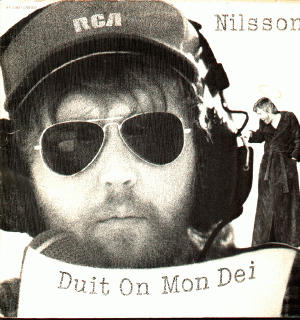 Duit On Mon
Dei
Duit On Mon
Dei
![]()
Harry's new contract deal with RCA must have turned out better than he had ever dreamed! Not only did the label sign him up for the next few years (partly because of the unfulfilled 'promise' of getting John and Ringo as well...see Pussy Cats) but the fine print of the contract gave him a freedom over his work that was unprecedented; he was on a far better financial deal with the success of 'Without You', 'Coconut' etc behind him, he did not have to 'pay' for studio time and he had a virtually free hand to record and release whatever he liked! Not all these things were good for him - that goes without saying!
So, when Harry booked the RCA Hollywood studio to record his next album he had all the permissions he needed to run the sessions as another enormous party. A bar was established offering free drinks to all the participants whilst at the studio (although vast amounts went missing - crates at a time!) and RCA's coffee machines kept bottles of sake (Japanese rice wine) warm.
Nilsson had assembled his usual bunch of session musicians (Voorman, Getz, Ringo, Keys, Price et al) for the recording but also (thankfully!) had the presence of mind (maybe in a more sober moment) to ask old accomplices Van Dyke Parks and Perry Botkin jr. to come on board. Botkin had worked with Harry very early in his career (in his pre-RCA days) and had been the man behind an album of demos - New Nilsson Songs - which allowed Harry to make his mark and perhaps even gain that first contract.
Having signed for RCA Harry teamed up with George Tipton and the rest is history, as they say. A couple of the Botkin tracks made it onto Pandemonium Shadow Show but Harry and Perry did not work together again until 1975. In the meantime Botkin had been nominated for an Oscar (Bless the Beasts and Children), written several other film soundtracks and was, perhaps, best known for his TV credits which ultimately included the themes for such series as the long-running soap opera 'The Young and the Restless' and 'Mork & Mindy'. He would pick up a Grammy in 1977 for 'Nadia's Theme' from the former of those 2 shows (incidentally, it was so named because it was the music used by Rumanian gymnast Nadia Comaneci in the 1976 Olympics, the original title having been 'Cotton's Dream').
Duit On Mon Dei was supported by a good advertising campaign from RCA including TV spots. A TV advert was recorded after Harry boasted about his prowess on a basketball court - he claimed to be able to shoot a basket from the half-way line. He stepped onto the court in front of the cameras and did it first time! 'OK,' they said, 'Once more with the cameras rolling!' It reportedly took a while to repeat the feat!
For the sessions Van Dyke Parks assumed the role of Music Co-ordinator and was awarded the title 'Maestro'. Even better - Harry sat down with Botkin for quite some time prior to the sessions in order to discuss the material he had and the best way for it to be presented. Botkin has said since that Harry was somewhat surprisingly well-prepared and his main task was doing the arrangements for orchestra on songs like 'Down By The Sea' and 'Salmon Falls'.
Other instrumental arrangements were worked out by the band, in the studio (a reflection on the lack of hiring charges, no doubt!) and these were overseen by the 'Maestro' with the notable exception of 'Easier For Me' which was superbly arranged and conducted NOT by Perry Botkin but by Jim Price.
From my earliest days listening to Nilsson I always thought of Duit and Sandman as a sort of 'double album', the 'feel' of the pair is so similar in places. It is interesting to note that other commentators share this view. Curtis Armstrong wrote in his liner notes for the Camden reissue: "Sandman...was...like the second disc of a Duit two-album set." Additionally, I always thought it bore a resemblance to The Beatles 'White Album' inasmuch as both sets only really had enough 'good' material for about one and a half albums! While I wouldn't be without either 'Revolution 9' or 'How To Write a Song' neither truly deserves a place on a mainstream pop album by a major artist. (At least George Harrison put his electronic music efforts onto an eponymously named separate LP!)
Duit suffers less than its partner in this respect - containing few songs that could in any way be described as 'fillers' and no real 'clunkers' at all amongst its completed tracks. It is a shame the album is not more widely known or appreciated (even by Nilssonians, it seems) as it features a Nilsson with largely recovered voice and mostly in very fine form. There are many exquisite moments on this LP and it deserves a second listen by those who discarded it and a first by those who chose not to listen on principle!
I bought this album very cheaply, I recall (American import copy with clipped sleeve) while on holiday in Hastings. It was a dullish day (typical British summer!) and I remember being thrilled to have found another Nilsson album towards my collection while perusing the record department in Debenhams department store. My family did eventually end up on the (stony) beach that day but I remember I couldn't wait to get back to my grandparents' house so that I could take that vinyl out of its sleeve and have a listen (wasn't that a great feeling - fighting against the static as you pulled the precious black disc out of the paper sleeve..?). In the meantime my dad asked for a look and I clearly recall seeing the concern on his face as he perused the track list and lyrics. The only 'rude' song he was previously aware of was a track on a compilation cassette of hit singles he had picked up in a garage a year or so before (It was the novelty hit 'Big 6' by Judge Dread). He used to fast forward past it on the car stereo but I had heard it a couple of times when I'd borrowed the tape. The song was, to me, utter rubbish - a couple of rude jokes/nursery rhymes spoken over banal background reggae. I was astonished when my Dad actually asked me if Nilsson was the same singer! Sacrilege!
Duit on Mon Dei is dedicated to the memory of Larry Hoefer. [I am not sure who Larry was (probably connected to Harry's cousin Doug Hoefer). Please email with any info]
Jesus Christ You're Tall (demo)
Exactly why Harry showed every intention of annoying RCA remains an unanswered question - but starting his 1st LP into a new contract like this could hardly do anything but antagonize his ever-frustrated bosses. He had wanted to call the LP 'God's Greatest Hits' in the first place and had been unceremoniously usurped on that one (the title did make it onto later editions of the album, in brackets after the 'proper' title). Whether RCA even got the joke (Do It On Monday) remains to be seen - I know I didn't for a while after I bought the LP - but I was very young!(1)
Maybe as a result of this lost battle or for some other reason this LP starts with my equal first most disliked Harry Nilsson song (guess what...the other equal first is the same song but on the next album!).
I dislike bad language full stop but, like many others, I have had to learn to live with it (but it still makes me flinch at times). However, as a Christian, I have a particular disdain for blasphemy and, no matter how many times I have tried to persuade myself otherwise over the years(2), there can be no doubt that this song is blasphemous 'in extremis'! That said, even a self-confessed 'serial blasphemer' (as Curtis Armstrong once described himself to me) told me that he, too, counts this as his least favourite of all Harry Nilsson's songs. If it had sat quietly in the RCA vaults and then surfaced at a Harryfest (the way other 'unreleasable' demos like 'I Want You To Sit On My Face' did) then, perhaps I'd just shake my head and sigh, maybe even with a slight smile, "THAT Harry...what's he like?". Placing it as first track on a new album...I can see why Nilsson was leaking fans like a punctured air balloon leaks gas!
Apart from the theory that Harry was simply doing all he could to annoy RCA, the nearest to an explanation I can give for this demo's inclusion - and in such a prominent place at the start of an album - is so that the LP could both start and end with some sort of religious connection (with 'Good For God' at the other end). That does not justify it, though, and I always consider this LP to start at track 2.
It's a Jungle Out There
One thing that makes Duit stand out from other Nilsson albums it is the way percussion is used on it. Most notable is the inclusion in the list of session-men of Robert Greenidge, widely acknowledged as the best steel drum player in the world(3). On this track, the 'proper' album opener, the steel drums feature prominently - there is a clear mistake on the album credits where this track and the next are confused; on this one the marimba is listed and the next song has the steel drum credit. Listen to the steel drum part if you can - it is a sensational virtuoso performance! Also notable in the music arrangement is the excellent flute work of Jay Migliori, best known as a founder member of 'Supersax' but also a member of the famous 'Wrecking Crew', the group of superb session musicians employed by Phil Spector and Brian Wilson in the mid 1960s. Another interesting instrumental feature of this album is the way Harry mixes down all the traditional 'rock' instruments: the drums, guitars etc are way down in the final mix with saxophones and percussion very high
After a suitably 'jungle' sounding intro Harry launches into a song which attempts to 'get inside' the heads of Tarzan and Jane. They 'chat' like a pair of suburban spouses, Tarzan lamenting that he has to fight a lion in order to get her a yellow dress. The big 'joke' is the one about their son confusing tools and toys, grabbing his dad's 'vine' instead of the one he was meant to swing on! Typical Nilsson humour, and one of the lyrics that put the consternation on my dad's face that day on Hastings beach!
Down By The Sea
This is the track that clearly begins with the marimba (played by Joe De Aguera of the 'Afro Blues Quintet') although the steel drums are present as well.
The song makes a good partner for 'Love Story', Randy Newman's whisk through the marriage of a lifetime. In that song the couple wonder what lies ahead: will they have a son grow up to be President? Will they retire and play checkers all day...til they pass away? In this song it is as though the couple are ready for retirement. I particularly like the review of the children in this song, "John, Philip, Susan, (itself a 'play' on the name of the great American composer known as the 'March King' - John Philip Sousa) Alice, Carol, Teddy, Bobby, Jenny...I think we had one too many - but I hope not out of line.' A great piece of poetry, that one - maybe one too many children but it wasn't Jenny - my guess is she was a real daddy's girl!
The song has a lovely laid-back feel to it - we'd all like to retire to a beach in the Caribbean and the image is enhanced by the wave effects that play in the background.
Kojak Columbo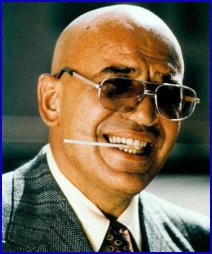
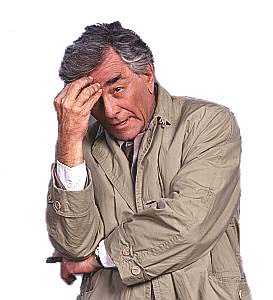 To
my knowledge this is the only erotic love song sung about - and to - a TV set!
The lyrics are silly, of course - "You've got 19 inches,
baby!", "I could twist your knobs right off" (Harry had lived in London long
enough to know the English colloquialism using 'knob' for penis.) It
almost goes without saying that the song's title is made up of the names of 2
very popular TV detectives, Columbo (Peter Falk, left) and Kojak (Telly Savalas,
right).
To
my knowledge this is the only erotic love song sung about - and to - a TV set!
The lyrics are silly, of course - "You've got 19 inches,
baby!", "I could twist your knobs right off" (Harry had lived in London long
enough to know the English colloquialism using 'knob' for penis.) It
almost goes without saying that the song's title is made up of the names of 2
very popular TV detectives, Columbo (Peter Falk, left) and Kojak (Telly Savalas,
right).
It's the same backing style and ensemble as the first two songs is repeated here again but with a faster tempo. Some clever wordplay - but it is noticeable how little Harry's voice is contributing to the album by this stage - to be honest anyone could have sung what we've heard so far, even if only Nilsson could have written it!
This was the single - it didn't chart but that didn't stop it being included on several 'Greatest Hits' compilations in years to come.
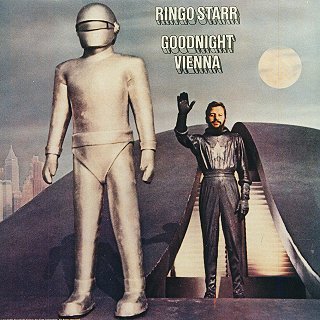 Easier For Me
Easier For Me
Originally written for, and recorded by, Ringo Starr this song appears on his 1974 album 'Goodnight Vienna' under the slightly different title 'Easy For Me'. It is nice to have Harry's own take as well and this is undoubtedly one of the best tracks on Duit. (Interestingly Harry sings 'Easy' himself at the end of the song.)
The orchestration is both sparse and magnificent. Sometimes the instruments are so sparse there is just one instrument playing. At other times there is a beautiful depth to the orchestration - helped, I'm sure, by the fact that each player is so closely miked. I hadn't realised that it was not Perry Botkin but Jim Price who did that work but everything Price asks the musicians to do they do with such sensitivity it compliments Nilsson's voice every bit as well as Gordon Jenkins's work had done 2 years or so before. Very near the end there is one very short, quiet and high violin note that always sends a shiver down my spine. It 'may' have been an accident - I sincerely hope it wasn't - but even if it were it stands as one of those 'lucky miracles' that happen in music from time to time. Sublime.
This song suits Harry's post throat-problems voice very well indeed. The slightly cracked and hoarse quality it had at this time does not detract from the beauty of his singing and this, rather inappropriately, wistful ballad would be an early choice if I ever put together another 'Nilsson Ballads' compilation one day.
Turn Out The Light
Other reviewers have come to the same conclusion as me inasmuch as the central four songs on Duit on Mon Dei (from 'Easier For Me' through to 'Puget Sound') are the strongest songs on the album. It's not hard to come to that opinion - these four songs would hold their own against most Nilsson material, especially late-era.
We know that Harry had had this song in his mind for quite some time - a version was recorded during the Pussy Cats sessions and is a bonus track on the Buddha reissue. He seemed to have always had a Latin/Caribbean style in mind, although the earlier version is more Jamaica than Trinidad! But this version brings in Robert Greenidge and his steel pans again as well as a very large group of saxophonists and pairs of trumpet players and trombonists. Completing the eclectic group of backing musicians are a trio of guitarists, Van Dyke on piano, a harp, drums, more marimba and - as far as I can ascertain - the only instance on a Nilsson recording of a cymbalom.(4)
This 'orchestra' was assembled by young American composer Fredric Myrow. Myrow had come to prominence in his teens when his early compositions were lauded by established musicians (including Shostakovich) and he had served as composer in residence for the New York Philharmonic under Leonard Bernstein. His entry into the world of pop music came via no less a figure than Jim Morrison, with whom he began an aborted rock opera. By the time he worked with Nilsson Myrow had already written film scores for several Hollywood movies, including the sci-fi cult classic 'Soylent Green'.(5)
It is both a powerful and energetic backing and Harry sings over it with tongue-in-cheek and together is produced one of those 'happy - make you smile' records.
Salmon Falls
This has always been my favourite song on this album. Composed along with Klaus Voorman (Harry wrote the words, Voorman the music) it is an epic production coming in at over 4 minutes and is the highlight of Perry Botkin's work on the album. Electric/pop instruments are almost entirely absent (with the exception of bass guitar and drums). Instead the steel pans and Botkin's own orchestra layer the accompaniment. It is interesting to recall, again, that Nilsson recorded this album in the same way he had done A Little Touch Of Schmilsson In The Night with Gordon Jenkins - i.e. 'live' to all intents and purposes, singing his vocals at the same time as the other musician laid down the backings. There is barely a hint of that here or elsewhere on Duit (excepting the 'party' songs yet to come).
This track is the best showcase for Robert Greenidge's work on Duit. Most of us associate steel drums with bands performing at carnivals (in the UK, most notably, the famous Notting Hill Carnival in London), playing rather hackneyed tunes like 'Rivers of Babylon'. With performances like this one Greenidge lifts to the instrument to the heights of a 'solo virtuoso' calibre. Performers like Greenidge truly are the Yehudi Menhuins and Ashkenazys of their own instrument and deserve due recognition.(6) After a string-soaked steel pan solo, one-and-a-half minute introduction, punctuated by the song uses the salmon returning to its place of birth to die as a metaphor for our own lives of discovery - perhaps with a spiritual, Eastern philosophy inspired, bent. If Greenidge takes the plaudits alongside Harry, who gives a full-blooded and dedicated vocal performance, then well-worth a mention at least is the staggeringly intricate and beautiful piano work of Jane Getz throughout the last third of the song. Getz was a former child prodigy in the world of jazz but she turned her back on the genre for more than twenty years, working as a session musician in LA before a triumphant return to her jazz roots in the 1990s, fronting her own band and recording acclaimed albums.
Puget Sound
Here we have, basically, a nursery rhyme set to music - an original one at that. Little paper/cardboard cut out figures playing in Puget Sound - I don't think there is any hidden message in the lyrics its just Harry playing with words. Musically the song is sax-driven with the ever-present array of percussion giving another distinctly Latin feel. As if to accentuate this Harry employs one of his silly voices (it comes out as an amalgam of Caribbean and the old Maurice Chevalier impression from 'The Most Beautiful World'). The song works despite its simplicity
What's Your Sign?
I always feel that these three final tracks sort of re-enact the Pussy Cats 'party album' feel. This song had been around, anyway, since the Son Of Schmilsson album sessions but had never quite been 'finished'. With Botkin at the helm, though, it has a more organized brand of aural chaos compared to the earlier attempts. This is a song in the 'Gospel' style and the 'Zodiac Singers' lend their voices to the arrangement. Gloria Jones features as Harry's duettist on the lead vocal. Jones was the partner of English pop star Marc Bolan (T Rex) and mother of his child (and, sadly, would a couple of years later be responsible for his death while drunk at the wheel of his car). Bolan is widely believed to have contributed more just than his partner to Duit and is mentioned on the sleeve. As all guitars are so low in the mix throughout the album it would be almost impossible to confirm any participation, however limited it may have been.
The joke in the song is the astrological nonsense, of course and a joke about 'a pair of forty-fours'. Rather lame in truth but they sound like they were having fun!
Home
Back to that familiar Latin again for this penultimate track. It gets rather lost at the end of an album that could only have possibly started going downhill after 'Salmon Falls' this harmless ditty is harmless enough but given even the rosiest-tinted spectacles can never raise it much higher than the status of a filler. Harry does a 'face-slap' solo midway through, which, at least, gives the song a unique contribution!
Good For God
This is the revision of 'How Can I Be Sure' (now, through its use in the movie 'A Good Year', probably better known than this song). I'm sure Harry had no intention of this song being taken at all seriously and confirms it by singing in the 'drunken' style more akin to 'The Flying Saucer Song'. He and Ringo belt out backing vocals and a big, booming bass drum accentuates the off beats like an inebriated marching band! The song was re-recorded for the end credits of a Marty Feldman movie, 'In God We Trust' in 1980. It tails off the album with a 'God' theme, is not quite blasphemous - in fact Harry seems to be 'standing up for God' in the face of a non-believer, and ends with quite a funny justification of his life and his hope that he can find 'a loophole...before they put me in the hole.' The way Harry was living at the time I think he realized he'd probably need quite a big loophole - probably more like a fully extended lasso!
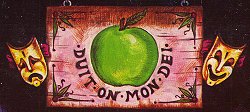 (1)
The
joke was not even a new one. 'Duit on Mon Dei' is a play on the motto of
the British Royal Family, 'Dieu et mon droit' (God and my right) and it had been
used a few years before on Ringo Starr's 'Ringo' album cover. Harry had
been on that album (backing vocals on 'You're Sixteen') so would have been well
aware of the joke - if not the instigator!
(1)
The
joke was not even a new one. 'Duit on Mon Dei' is a play on the motto of
the British Royal Family, 'Dieu et mon droit' (God and my right) and it had been
used a few years before on Ringo Starr's 'Ringo' album cover. Harry had
been on that album (backing vocals on 'You're Sixteen') so would have been well
aware of the joke - if not the instigator!
(2)I tried imagining, for instance that Harry was actually singing the song to Jesus himself - although why Christ would have ever played basketball seemed irrelevant for a while to my argument.
(3) It was only while researching for this
review that I discovered that Greenidge had appeared on several of my favourite
recordings - John Lennon's 'Double Fantasy', Ringo's 'Rotogravure' and Brian
Wilson/Van Dyke Parks 'Orange Crate Art' to name just three. He has also worked
with Earth, Wind and Fire, Barry Manilow and Jimmy Buffett amongst many others.
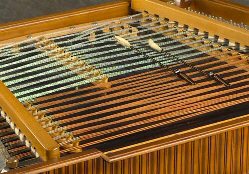 (4)
A
cymbalom (there are various alternate spellings) is an Eastern European hammer
dulcimer. It can be played with sticks or with finger extensions (see
right) that look less like musical equipment than props from a horror movie (or
maybe Johnny Depp's 'Edward Scissorhands')! The cymbalom is difficult to
use in Western ensembles due to its use of unconventional tuning - you will hear
this in the introduction to the song. Milt Holland, who played the
instrument here was a well known American percussionist who specialized in
'unusual' instruments such as this one, tablas and African drums. He
contributed the West Side Story, was the 'twitch' in Samantha's nose in the hit
TV series 'Bewitched' and Tinkerbell's 'twinkle' in Disney's Peter Pan.
His admirers in the pop world included both Ringo (he had recorded with The
Beatles) and Bob Dylan.
(4)
A
cymbalom (there are various alternate spellings) is an Eastern European hammer
dulcimer. It can be played with sticks or with finger extensions (see
right) that look less like musical equipment than props from a horror movie (or
maybe Johnny Depp's 'Edward Scissorhands')! The cymbalom is difficult to
use in Western ensembles due to its use of unconventional tuning - you will hear
this in the introduction to the song. Milt Holland, who played the
instrument here was a well known American percussionist who specialized in
'unusual' instruments such as this one, tablas and African drums. He
contributed the West Side Story, was the 'twitch' in Samantha's nose in the hit
TV series 'Bewitched' and Tinkerbell's 'twinkle' in Disney's Peter Pan.
His admirers in the pop world included both Ringo (he had recorded with The
Beatles) and Bob Dylan.
(5) This rather bizarre 1973 movie starred Charlton Heston and Hollywood veteran Edward G Robinson (his last movie). It is famous for its conclusion where we discover that the eponymous foodstuff is actually recycled human bodies!
(6) I will always champion minority instruments! Being a euphoniumist (my primary instrument amongst the several I claim to be able to 'play') I am only too aware that it is still impossible to make a living if you just happen to be good at the wrong one! I was told at the age of 15 that, were I 'as good' on the piano, flute or violin as I was on the euphonium I would have been able to make a very good living. I missed out on a scholarship to the Royal College of Music because the euphonium was regarded as a 'minor' instrument. I believe times and attitudes have changed considerably in the last 30 years but I am still only aware of a small number of euphonium players who have managed to make any kind of living from the instrument and even these had to supplement their earnings by teaching, conducting etc. These players had their 'start' in the contesting brass band world - as a Salvation Army bandsman that door was closed to me unless I left my church duties, something I would never have done, so even that small chance was lost. I am unaware of the existence of a steel pan concerto just as there has never been an orchestral euphonium concerto. Shame!